Congratulations to Michelle Stantial, who successfully defended her M.S. thesis on December 3rd, 2014, and received her degree. Michelle's thesis was entitled, "Flight Behavior of Breeding Piping Plovers: Implications for Risk of Collision with Wind Turbines," which was funded by the U.S. Fish and Wildlife Service and the Conserve Wildlife Foundation of New Jersey. The study was intended to address the potential impacts of coastal wind power development on an endangered species nesting along the Atlantic coast. Using flight data, the study predicted that the total number of piping plovers killed per breeding season (adjusted for 98 percent avoidance) could range among study sites from 0.01 to 0.29 for a small-scale residential turbine, 0.03 to 0.99 for a medium-sized turbine, and 0.06 to 2.27 with a large,utility-style turbine, and that collision risk was directly related to habitat configuration The risk assessment was aimed at providing wildlife managers a useful tool when making determinations throughout the permitting process as to whether or not piping plovers would be negatively impacted if turbines were to be built at or near nesting beaches.
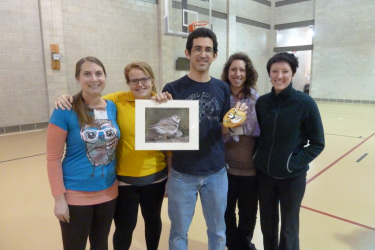 Dr. Cohen and grad students Michelle Stantial, Alison Kocek, Maureen Durkin, and Melissa Althouse attended the 2014 Atlantic Coast Piping Plover and Least Tern Workshop at National Conservation Training Center in Shepherdstown, WV this month. Dr. Cohen helped present the results of a structured decision making workshop for Piping Plover nest exclosures that he and Alison participated in this past December. Michelle presented initial results and conclusions from her study on Piping Plover flight behavior on the Atlantic Coast. Her work aims to identify whether proposed wind turbines placed within Piping Plover breeding areas will impact the birds during flight. As wind energy gains popularity, this issue is relevant for site managers across the breeding range, and her presentation was met with much interest. Maureen presented a poster on plover and tern road mortality in Florida. The whole lab group competed against eight other teams of piping plover scientists and managers in the 1st annual Piping Plover Olympics, which included trivia, a relay, logic puzzle, and band resighting events. After a tough competition, clinched by Dr. Cohen's rousing dramatic reenactment of a broken wing display, the ESF team took home the gold medal (shell). Lab members participate in structured decision making workshop for Piping Plover management1/8/2014
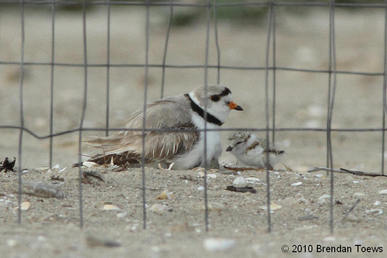 Source: naturecanadablog.blogspot.com Source: naturecanadablog.blogspot.com In December, Dr. Cohen and grad student Alison Kocek participated in a structured decision making workshop at the National Conservation Training Center in Shepherdstown, West Virginia focused on the use of nest exclosures for management of the federally-threatened Atlantic Coast piping plover. Exclosures are a common management technique for preventing predation of eggs, but some predators may use them to trap and kill nesting adults, or may harass adults leading to abandonment of the nest. The workshop was attended by three ecological modelers from the U.S. Geological Survey and several biologists and wildlife managers from Maine to Maryland. The participants built a population model for the piping plover, to serve as a basis for understanding the tradeoff in population growth rate between reduced egg predation and increased abandonment and adult mortality due to exclosures. The workshop team completed a prototype model, identified optimal decisions for exclosure use under different values for the model parameters, and set forth a plan for addressing uncertainties in the model that included presentation of the prototype to a wider audience for review and feedback. 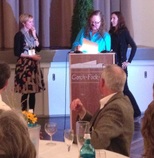 Michelle Stantial received an award for her oral presentation, "Flight behaviors of Piping Plovers Charadrius melodus: implications for risk of collision with turbines and other human structures" at the 37th Annual Meeting of the Waterbird Society in Wilhelmshaven, Germany. Maureen Durkin received honorable mention for presenting, "Waterbird road mortality at Gulf Islands National Seashore, Florida." 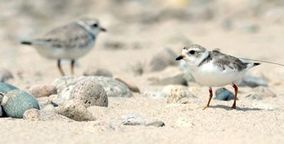 Source: Cape Cod Times/ Merrily Cassidy Source: Cape Cod Times/ Merrily Cassidy M.S. student Michelle Stantial's work examining the potential impact of wind turbines on Piping Plovers in Massachusetts received a write-up in the Cape Cod Times this summer. Nice work Michelle! Read the full article: http://www.capecodonline.com/apps/pbcs.dll/article?AID=/20130723/NEWS/307230323 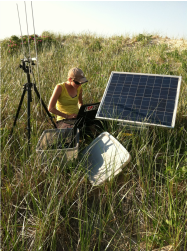 For her second field season studying piping plover movements and flight patterns in Massachusetts and New Jersey, M.S. student Michelle Stantial was able to build an automated telemetry system for monitoring radio-tagged plovers at her study sites. Michelle was awarded grants from the Goldenrod Foundation and the Garden Club of America to fund the telemetry station. She says of the system, "It helps us detect movements of piping plovers during times of poor weather and low-light conditions (times when birds are more susceptible to collisions with turbines). We leave it out on the beach and let it 'listen' to a bird with a telemetry unit for a few nights in a row, then we switch to another individual." Michelle's research will examine the implications of wind turbines piping plovers, specifically examining the potential for collision mortality if turbines are built in or near their habitat. |
Categories
All
Archives
July 2019
|
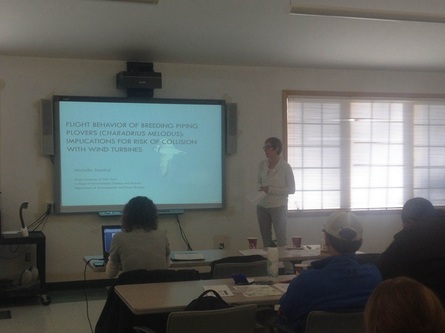
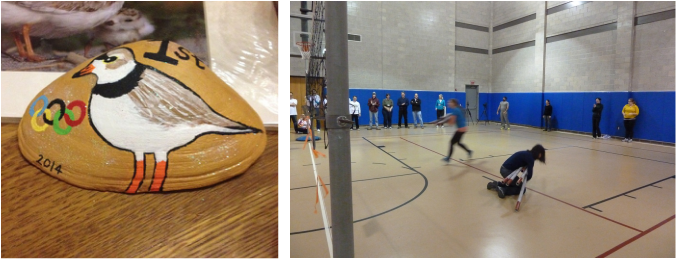
 RSS Feed
RSS Feed
